The Cataclysm expansion brings with it a new secondary profession, Archaeology, which every character can pick up in addition to their other professions. This profession sends players all over Azeroth and beyond to dig up artifacts and build their collections.
Archaeology offers many unique rewards, including toys, mounts, pets, achievements, and even some strong endgame gear, all of which are account-bound and can be shared across your characters. For this reason, most players will only level Archaeology on one character.
This guide will give a complete overview of the Archaeology profession so you can unleash your inner Indiana Jones in World of Warcraft!
Archaeology Rewards
Archaeology offers many unique vanity items as well as several pieces of 359 item level gear. These items are all account bound, meaning you can mail them to your other characters. The equipment is generally better than anything other than Heroic raid loot, so many players will want to obtain these items as part of their endgame gearing process.
Artifact | Type | Fragments |
|---|---|---|
– | 130 Draenei | |
Toy | 100 Fossil | |
Toy | 124 Draenei | |
Toy | 140 Nerubian | |
Toy | 150 Night Elf | |
Toy | 100 Dwarf | |
Toy | 100 Night Elf | |
Toy | 100 Troll | |
Toy | 100 Night Elf | |
Toy | 98 Night Elf | |
Toy | 150 Tol’vir | |
Toy | 140 Nerubian | |
Toy | 150 Dwarf | |
Toy | 100 Vrykul | |
Toy | 150 Night Elf | |
Pet | 100 Dwarf | |
Pet | 150 Tol’vir | |
Pet | 100 Fossil | |
Pet | 120 Fossil | |
Pet | 100 Troll | |
Mount | 100 Fossil | |
Mount | 150 Tol’vir | |
1H Axe | 130 Vrykul | |
1H Sword | 150 Tol’vir | |
2H Sword | 150 Troll | |
Cloth Chest | 100 Night Elf | |
Finger | 150 Tol’vir | |
Mail Head | 130 Orc | |
Shield | 150 Fossil | |
Staff | 150 Tol’vir | |
Staff | 150 Dwarf | |
Trinket | 150 Night Elf |
Achievements
There are also many achievements you can earn through Archaeology, including three which award unique titles.
Here’s a complete list:
Achievement | Description | Reward |
|---|---|---|
Obtain 150 skill points in archaeology. | ||
Obtain 225 skill points in archaeology. | ||
Obtain 300 skill points in archaeology. | ||
Obtain 375 skill points in archaeology. | ||
Obtain 450 skill points in archaeology. | ||
Obtain 525 skill points in archaeology. | ||
Find 10 unique common artifacts. | ||
Find 50 common artifacts. | ||
Find 100 common artifacts. | ||
Find a rare artifact. | Title: Assistant Professor | |
Find 10 rare artifacts. | Title: Associate Professor | |
Find 20 rare artifacts | Title: Professor | |
Recover archaeology artifacts from each of the 9 races. | ||
Recover the following scepters from the various races of Azeroth. | ||
Recover the night elf artifacts that tell the fateful story of Pyramond and Theleste. | ||
Discover who slew the dread wyrm Kaldrigos by collecting artifacts. | ||
Discover how orc Chieftan Hargal was killed by collecting artifacts. | ||
Discover the artifacts of the Dark Iron thanes. | ||
Recover the tol’vir artifacts that tell of the rise and fall of Emperor Ninjter. |
Learning Archaeology
Unlike other professions which can be learned as early as level 1, Archaeology can’t be trained until level 20. But as with all professions in Cataclysm, you can train all levels of the skill at any Archaeology trainer. You’ll need to train the next tier of the skill every 75 levels before you can progress any further.
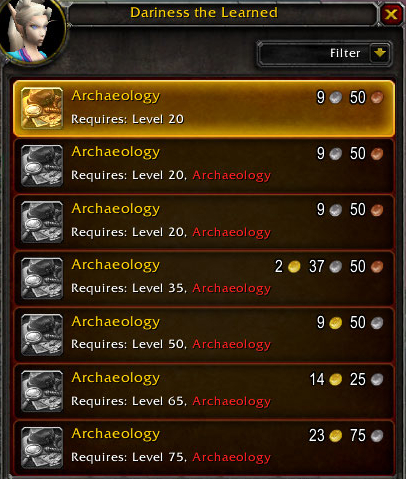
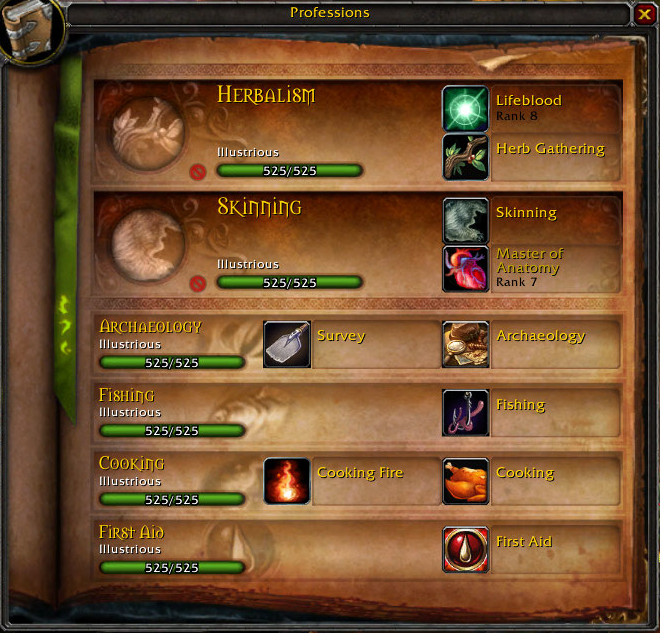
Archaeology Trainers
There is an Archaeology trainer in every major city. Here are their names and locations:
Neutral:
- Boduro the Seeker – Shattrath, Lower City (62.5, 70.2)
- Dariness the Learned – Dalaran, The Legerdemain Lounge (48.5, 38.6)
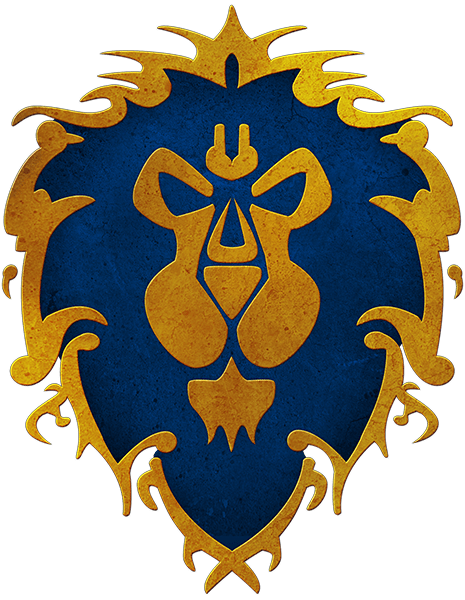 Alliance:
Alliance:
- Diya – The Exodar, The Vault of Lights (34.6, 66.8)
- Doktor Professor Ironpants – Ironforge, Hall of Explorers (75.6, 11.6)
- Hammon the Jaded – Darnassus, The Temple of the Moon (43.2, 83.6)
- Harrison Jones – Stormwind, Stormwind Keep (85.6, 25.8)
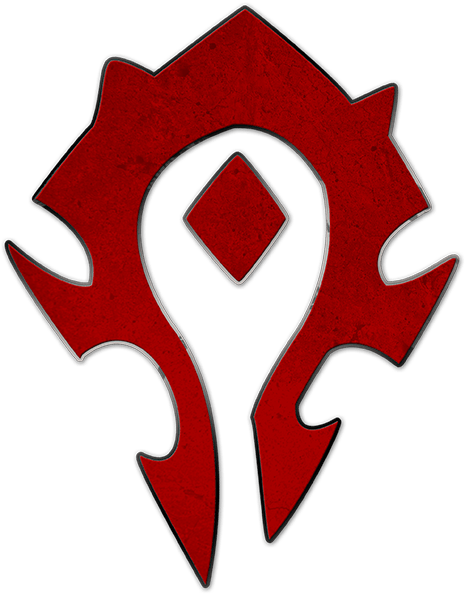 Horde:
Horde:
- Adam Hossack – Undercity, Magic Quarter (76.0, 36.4)
- Belloc Brightblade – Orgrimmar, Grommash Hold (49.0, 79.6)
- Elynara – Silvermoon City, The Royal Exchange (81.6, 63.8)
- Otoh Greyhide – Thunder Bluff, Elder Rise (75.8, 28.0)
Leveling Archaeology
There are three ways that you can gain skill points in Archaeology:
- 1 point when you dig up a fragment (only up to level 50 skill)
- 5 points when you solve a common artifact
- 15 points when you solve a rare artifact
The most efficient way to level is to dig for fragments for your first 50 levels and hold onto your fragments and keystones until digging stops giving skill points. Then you can begin solving artifacts all the way to the level cap.
The Dwarf Racial
Dwarves receive a new racial ability in Cataclysm, Explorer, which makes them the best race to learn Archaeology. This ability increases the number of fragments you can loot per dig as well as helping you survey faster.
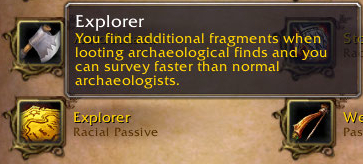
Digging for Fragments
To use your Archaeology skill, you’ll first need to locate a digsite. Then you’ll be able to use your Survey ability to dig for artifacts. We’ll walk you through the process below.
Digsites
In order to dig for artifacts, you’ll first need to locate a digsite. There will always be four digsites available per continent. When you have completed a digsite on that continent, a new one will appear on your map. Your digsites are your own – no one else can come and dig up your artifacts, although you may encounter other players who happen to have a digsite in the same place.
Digsites appear on the continent map as a shovel icon. Zooming in on the zone, you will see the areas marked with a red outline.
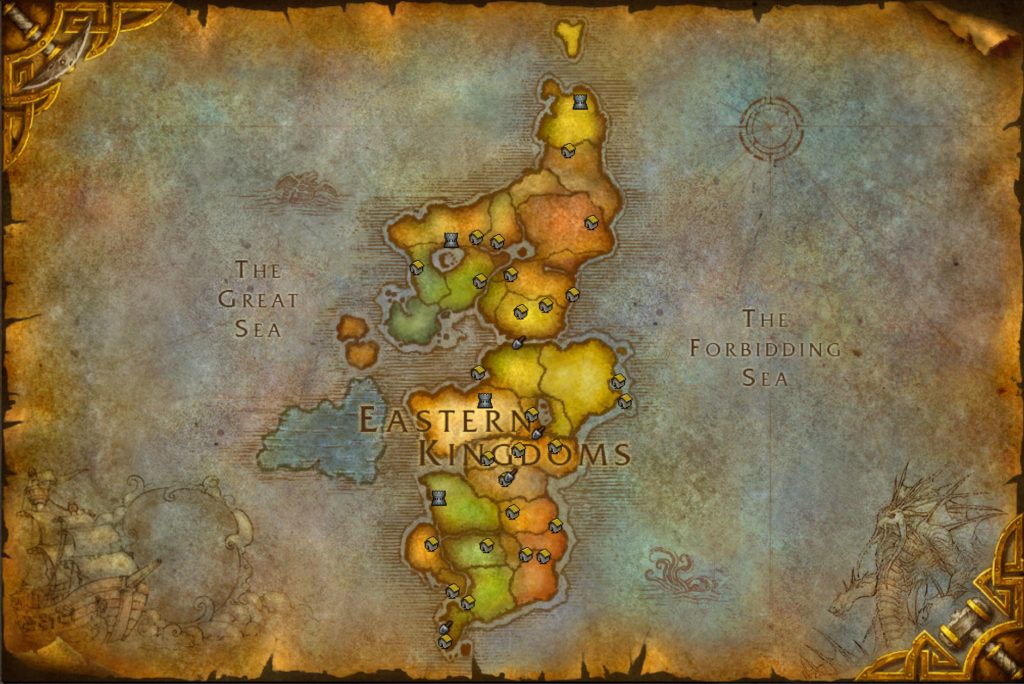
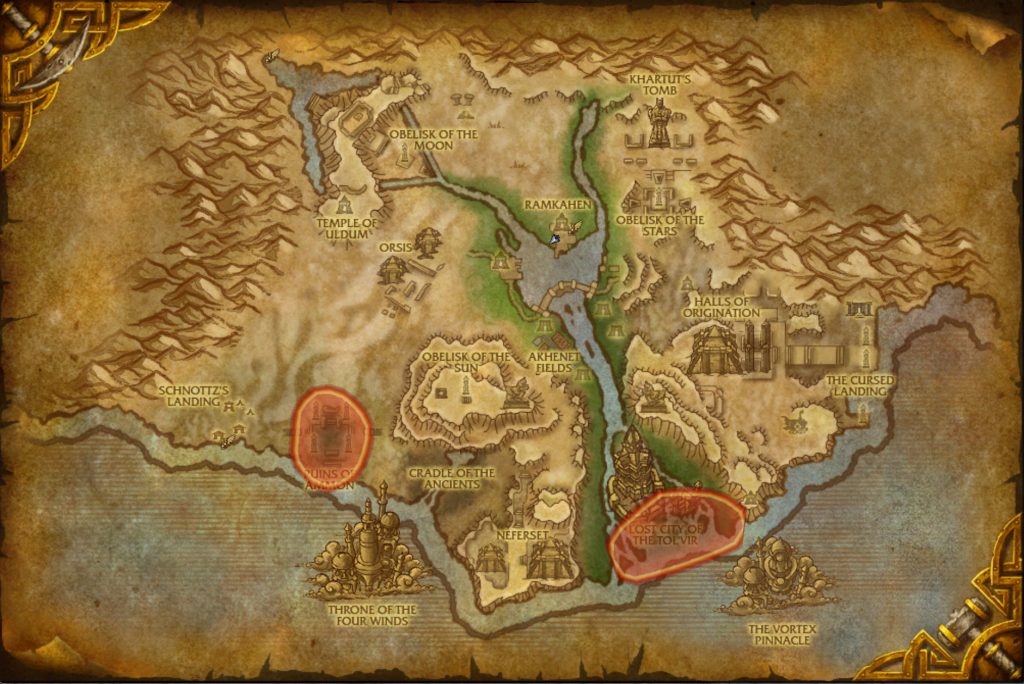
- At first you will only be able to access digsites in Eastern Kingdoms and Kalimdor.
- When you reach level 300 in the Archaeology skill, you’ll be able to access Outland digsites.
- At level 375, you’ll be able to dig in Northrend.
- At 450, you’ll be able to dig in level 80-85 Cataclysm zones.
Digsites appear in specific locations, so you may wind up digging in the same one several times. You’ll never see them in starting zones since the characters there are too low level for Archaeology.
Surveying
When you arrive at a digsite, you can use your Survey ability. You can find it in the Professions tab of your Spellbook. You will only be able to Survey while you are inside a digsite (the red outline on the map).
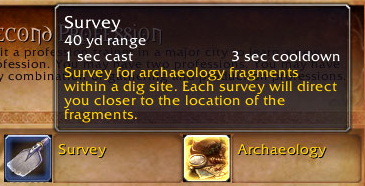
When you Survey, an object that looks like a telescope will appear, pointing in the general direction of the nearest fragment. The attached light will indicate how far away the fragment is. The following are rough distances, although it may vary based on the size of the digsite:
- Red: 80 yards or more
- Yellow: 40-80 yards
- Green: Under 40 yards
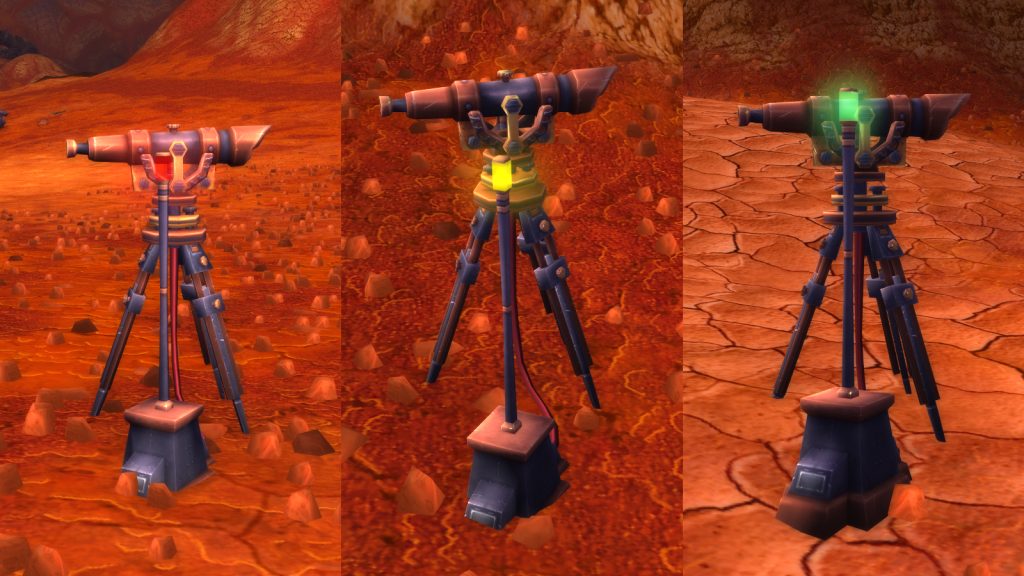
Move in the direction indicated by the telescope (the direction that the wider end is pointing) and Survey again. You may have to do this several times before you find the right spot. The direction indicated by the telescope is not exact, but more of a cone. Sometimes you will luck out and find the fragment on your first dig or even find multiple in the same spot, without the telescope even appearing.
When you use the Survey ability close enough to the fragment, the the fragment will appear on the ground instead of the telescope, and you will be able to pick it up by clicking on it.
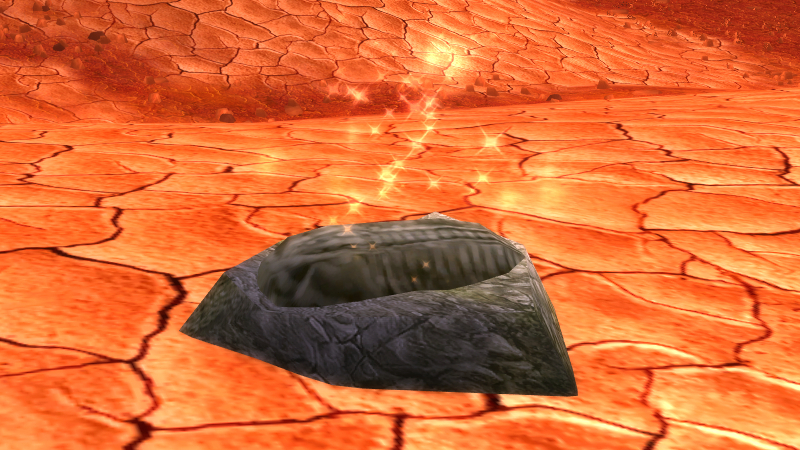
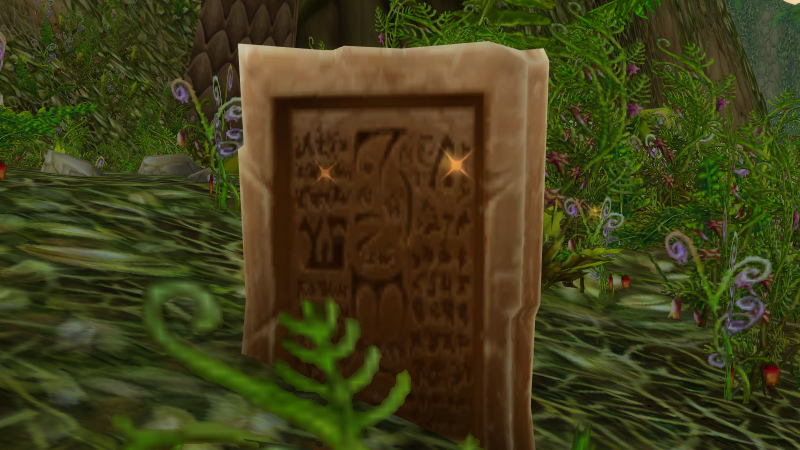
The appearance of the fragment varies based on the type of digsite you’re in, but it will be easily identified by the golden sparkles around it. If you’re having trouble locating it, you should be able to see it as a yellow dot on your minimap. Don’t wait too long to pick it up, because it can despawn and then you’ll have to start over. Looting it will net you multiple fragments and possibly a keystone as well.
When you’ve looted from three fragments, the current digsite will disappear from your map and a new one will appear somewhere on the same continent.
Crafting Artifacts
Surveying will net you fragments and keystones, which you can use to create artifacts. We’ll explain each of these items below.
Fragments
Fragments are the basic item you will use to assemble artifacts. The type of fragments you’ll dig up depends upon the digsite location. Since each continent will only have four active digsites at a time, farming specific fragments will often require digging up unrelated sites until a digsite spawns with the fragments you need. You can have up to 200 fragments of each type.
Here is a table with all the different types of fragments, the skill level required to dig them up, and the locations where you’ll find them. Location names are listed in order of how common the fragment type is in each location, with the top location being the best place to look for it.
Fragment Type | Level | Locations |
|---|---|---|
Dwarf | 1 | Eastern Kingdoms Kalimdor |
Fossil | 1 | Eastern Kingdoms Kalimdor |
Night Elf | 1 | Kalimdor Northrend Eastern Kingdoms |
Troll | 1 | Eastern Kingdoms Northrend Kalimdor |
Draenei | 300 | Outland |
Orc | 300 | Outland |
Nerubian | 375 | Northrend Eastern Kingdoms |
Vrykul | 375 | Northrend |
Tol’vir | 450 | Kalimdor – Uldum only |
Keystones
When you dig up fragments you may also occasionally loot a keystone. These are tradeable items that can be bought and sold on the Auction House. They can be used for two different purposes: to provide buffs in endgame dungeons (see the Archaeology Dungeon Quests section at the bottom of this guide) or to help complete artifacts.
One keystone is equivalent to 12 fragments of the same type, but you can only use 1-3 keystones per artifact, so you will still need to collect fragments as well. There is no keystone for fossils. Below are all of the keystones and their associated artifact types.
Keystone | Type |
|---|---|
Draenei | |
Dwarf | |
Night Elf | |
Nerubian | |
Orc | |
Tol’vir | |
Troll | |
Vrykul |
Artifacts
If you open your Archaeology profession window and click on the blue bookmark on the right, you can see your current research projects. You’ll start a new one every time you acquire a new type of fragment, and they will stay there until you complete them. You can’t choose which artifact you would like to work on – the game will select one at random. So if you’re after a specific reward, you may have to complete many artifacts of the same type before you can work on the one you want.
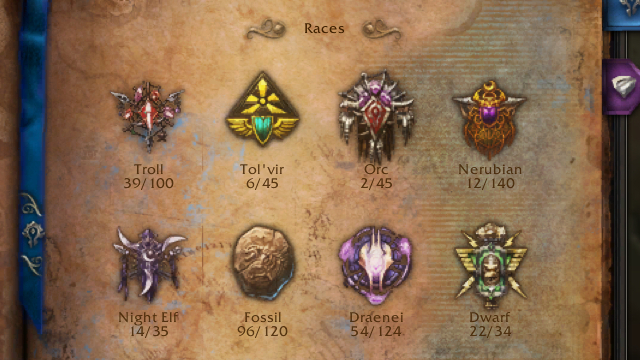
Clicking on a race will open its current research project. Most of these will be common artifacts, gray or white quality items that can be sold to vendors for gold. Occasionally you will get a rare artifact that rewards a toy, pet, mount, or a piece of endgame gear. You can see a complete list of these rare artifacts in the Archaeology Rewards section at the top of this guide.
You will see a progress bar indicating how many fragments you currently have of that type. There are also hexagonal sockets below the progress bar where you can insert keystones of the same type. Most common artifacts will have one keystone slot and rare artifacts will have three slots. A keystone will add the equivalent of 12 fragments to your progress bar.
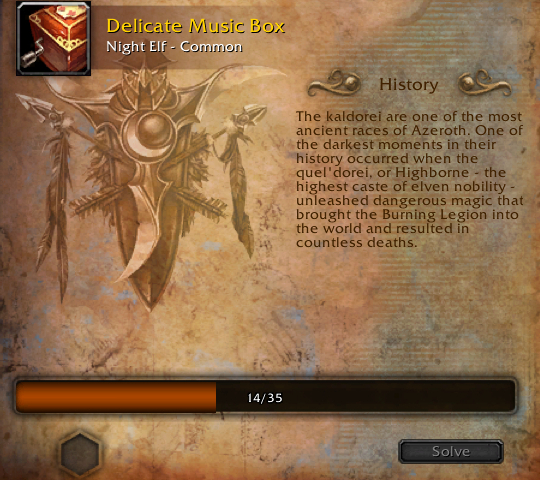
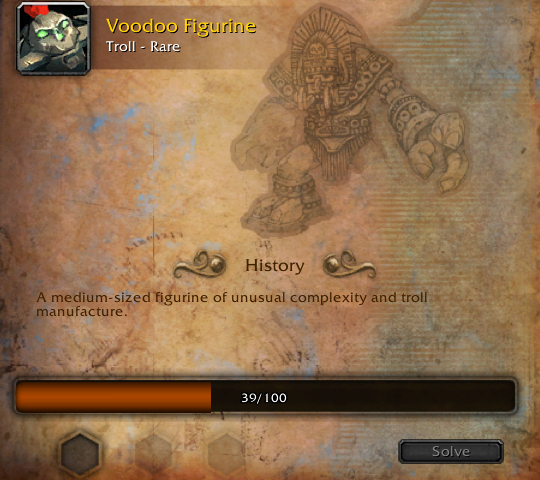
When the progress bar is full, the Solve button will turn red and you can click it to create the item. You will keep any leftover fragments. A new research project will appear and the item will be placed in your inventory.
You can view your completed artifacts by clicking on the purple bookmark in the Archaeology window.
Archaeology Dungeon Quests
If your character has leveled Archaeology to at least 425 skill level, you will have access to repeatable quests inside several high-level dungeons. These quests require you to turn in a specific keystone. In return they will grant your party a unique buff for the duration of the dungeon.
Below you can see all of the buffs as well as their required quest and keystone.
Location | Quest | Keystone | Buff |
|---|---|---|---|

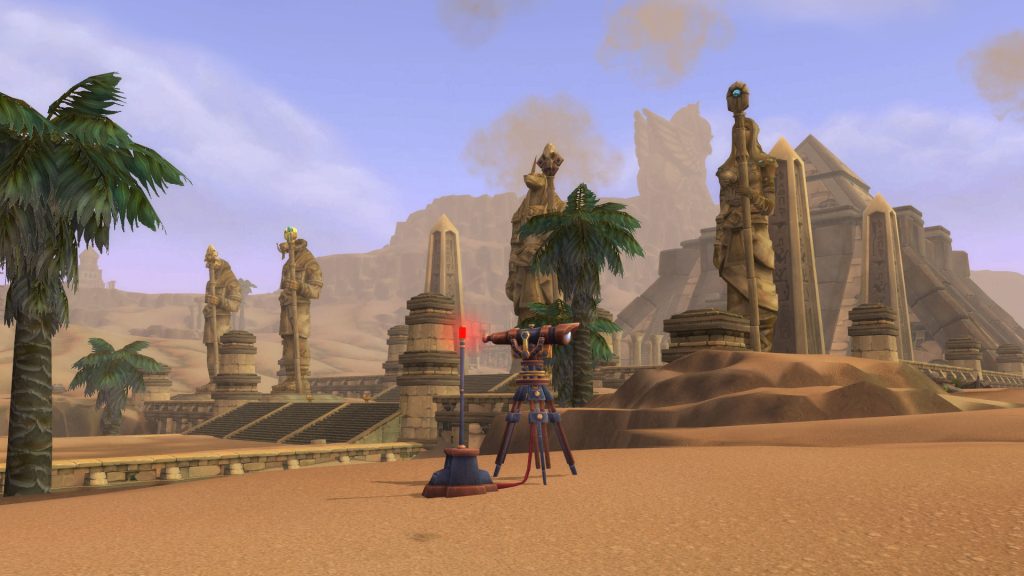

Useful guide, I noticed you listed the wrong Zin’rokh in the items list that is the one from Hakkar caused a bit of confusion in my g chat haha
Whoops! Thanks for the heads up!
Thanks
I feel like Canopic Jar for Tol’Vir should be noted as it contains the alchemy mount recipe for Vial of the Sands
Some have suggested that the chance of epic or rare puzzles is higher within the first ten solves, so if possible dont solve too much on your preferred faction